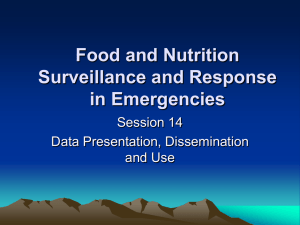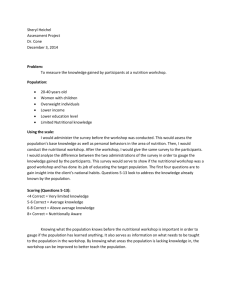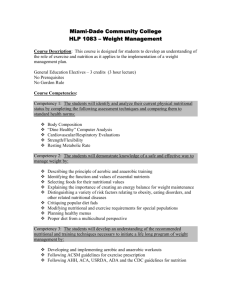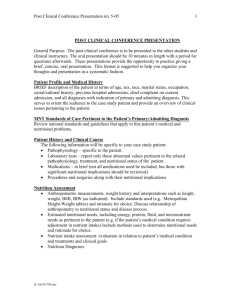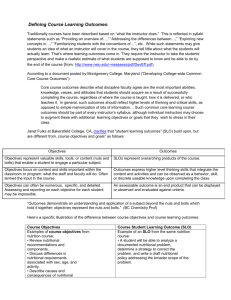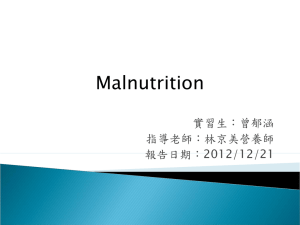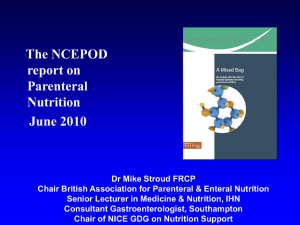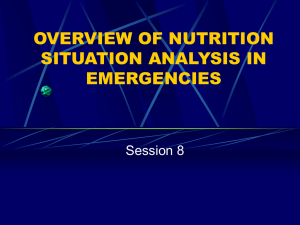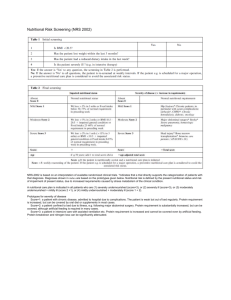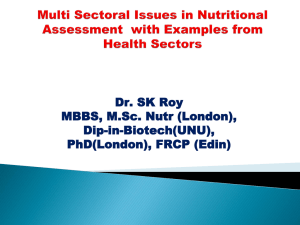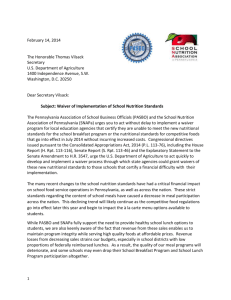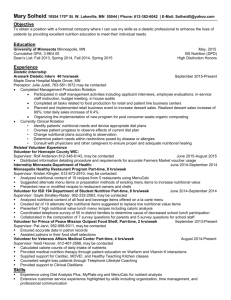nutritional care plan
advertisement
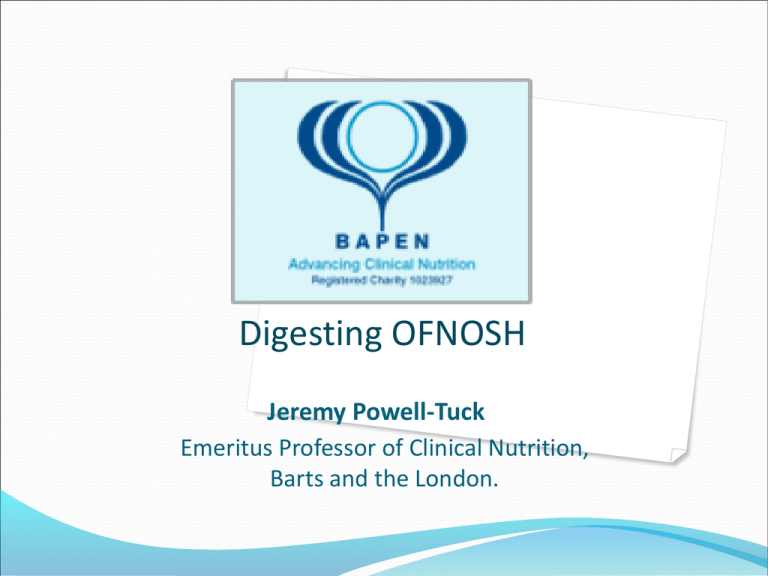
Digesting OFNOSH Jeremy Powell-Tuck Emeritus Professor of Clinical Nutrition, Barts and the London. What is the prevalence of MUST defined malnutrition in hospitals? 28%+ overall 22% “high” Council of Europe: 10 Key Characteristics of good nutritional care in hospitals http://www.bda.uk.com/resources/071012CoEHospitalNutrition.pdf 1 All patients are screened on admission and re-screened weekly. 2 All patients have a nutritional care plan: their needs and how they will be met 3 The hospital includes specific guidance on food services and nutritional care in its Clinical Governance arrangements. 4 Patients are involved in the planning and monitoring arrangements for food service provision. 5 The ward implements Protected Mealtimes … 6 All staff have the appropriate skills .. and receive regular training on nutritional care and management. 7 Hospital facilities provide and deliver an excellent experience of food service and nutritional care 24 hours a day, every day. 8The hospital has a policy for food service and nutritional care which is patient centred and performance managed in line with home country governance frameworks. 9 Food service and nutritional care is delivered to the patient safely. 10The hospital supports a multi-disciplinary approach to nutritional care Raise awareness Provide acceptable guidance Encourage nutritional screening Provide training Clarify standards and strengthen inspection and regulation "Good nutrition and hydration are vital to help people maintain good health, recover from illness and get back on their feet Paul Burstow, Minister of State for Care Services and Lead for Older People and Care Services The cost of diseaserelated malnutrition in the UK…… Cost of malnutrition in UK >£7billion Intervention is effective in reducing length of stay in surgical and nonsurgical patients Effects of Malnutrition Impaired immune response Reduced muscle strength, and fatigue Inactivity Loss of temperature regulation Impaired wound healing Impaired regulation of salt and water Periods Foetal and Infant programming Specific nutrient deficiencies Impaired psycho-social function Growth, sexual development, neuro-cognitive development, bone health OFNOSH http://www.bapen.org.u k/ofnsh/index.html Access to previous websites and reports Collation of them into a coherent whole Definition of roles Aspirational “five year plan” OFNOSH BAPEN.org.uk OFNOSH BAPEN.org.uk Organisation of Food and Nutritional Support in Hospitals: OFNOSH The many All admissions: hospital food. Ward nurses and medical teams screen patients. Some patients require oral nutritional supplements: may require assessment by dietitians Enteral feeds: dietitians The few Nutrition support team Parenteral Nutrition from Food to Parenteral Nutrition 26% NCEPOD Report on PN: 3138 cases, 1548 full returns, a Mixed Bag 74 case note returns, 326 questionnaire returns, 1190 no data returned Good practice 19% No NST involved 47.3% PN not indicated 29% Inadequate assessment 54% Unreasonable delay recognition 16% Unreasonable delay starting 9% Avoidable metabolic complications 51% Avoidable complications 46% Creating the culture Nurses Doctors Catering staff Pharmacists Dietitians Digesting OFNOSH Be aware Use the website critically Create discussion and collaboration Facilitate senior strategy discussions and implementation Some websites to look at Nutrition Now: http://www.rcn.org.uk/__data/assets/pdf_file/0006/187989/003284.pd f NICE Guideline: http://www.nice.org.uk/guidance/index.jsp?action=download&o=2997 8 Council of Europe Resolution 10 key characteristics of good nutritional care http://www.bda.uk.com/resources/071012CoEHospitalNutrition.pdf Essence of Care http://www.dh.gov.uk/en/Publicationsandstatistics/Publications/Publi cationsPolicyAndGuidance/DH_119969 How might progress be made? Essence of care: benchmarking (Food and Drink) Better Hospital Food Protected mealtimes Establish/strengthen Dietetics Establish steering committee Create multiprofessional NST Appoint nutrition nurse specialist(s) Develop out-patient services – home and community links Develop/formalise education and training Develop specialist teams
